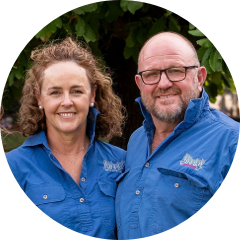Harvest weed seed control
This project was completed in 2018.
Project Officer
Kate Coffey
WHY THIS PROJECT WAS NEEDED
At the time this project was established, there was little information about the number of weed seeds shed by plants, left behind or thrown over the back during the harvest of high yielding crops in the high rainfall zones.
Non-chemical cultural control options such as harvest weed seed control (HWSC), offers opportunities for farmers to reduce weed seed at harvest. This project aimed to investigate the effectiveness of HWSC measures in the high rainfall zones by looking at the timing of seed shedding in ryegrass and through replicated and demonstration trials.
In short: Harvest weed seed control (HWSC) involves the collection and/or destruction of weed seeds at harvest. This project investigated HWSC as a non-chemical control method to reduce the seedbank of weeds, such as annual ryegrass, in the Riverine Plains.
Project focus
Harvest weed seed control (HWSC) – the collection and/or destruction of weed seeds at harvest — is a non-chemical control method, which can be used to reduce the seedbank of weeds, such as annual ryegrass (Lolium rigidium). Techniques include mechanical weed destruction, or methods involving carting or baling chaff straight after harvest. Chaff can also be concentrated behind the header in a row, which is then left to mulch (chaff lining or decking) or concentrated in a narrow windrow behind the header and burnt (narrow windrow burning).
A major premise of HWSC is that the targeted weed species retain a high proportion of their total seed production at crop maturity.
This project tested a range of treatments to develop harvest weed seed control options. The objective of this project was to target a 20% increase in farmers using non-chemical (or cultural) weed management tools to reduce economic losses.
The project had two components: replicated small plot trials and on-farm demonstrations. The trial sites included small, replicated trial plots and large demonstration plots. These sites aimed to test different cultural (non-chemical) techniques to reduce weed seed banks. They included:
- Variety choice (Lancer, La Trobe, Trojan, Wedgetail)
- Time of sowing
- Stubble harvest height (15cm and 30cm)
- Harvest weed seed destruction
- Windrow burning (harvest 15cm)
- Blanket burning (harvest as high as possible)
Project outcomes
Key messages from the project trials were that:
- There was no difference between a harvest height of 30cm and 15cm in terms of the number of weed seeds returned to the soil.
- In wheat crops with high annual ryegrass plant populations, a large percentage of the ryegrass seed matures and drops in the month before wheat harvest, limiting the effectiveness of HWSC in the Riverine Plains region. In 2017, approximately 30% of total ryegrass weed seeds were removed by the harvest process.
- HWSC could be used as one tool in a larger integrated weed management strategy.
The full report with results from this work in the Riverine Plains region was published in Research for the Riverine Plains, 2018.
Results and analysis from project work undertaken across the southern high rainfall zone is available via the GRDC report into HWSC for the southern high rainfall zone.
Find out more
For further information, please contact Riverine Plains Senior Project Manager Kate Coffey at kate@riverineplains.org.au
Project investment
This was an investment of the Grains Research and Development Corporation (GRDC).
Partners
Focus areas
MORE ON Grains & Sustainability
Our research enhances food production, increases environmental resilience and improves community connection across the Riverine Plains. See how our research creates impact.
-
Grains
Sustainability
-
Business
Sustainability
-
Livestock
Sustainability
-
Grains
Business
-
Grains
Sustainability
-
Grains
Livestock
-
Grains
Livestock
-
Soils
Sustainability
-
Soils
Sustainability
-
Grains
Sustainability
-
Grains
Business
-
Sustainability
Drought
-
Sustainability
-
Grains
Sustainability
-
Grains
-
Grains
-
Soils
Grains
-
Soils
Sustainability
-
Grains
Soils
-
Drought
Grains
-
Soils
Grains
-
Grains
-
Grains
Soils
-
Soils
Grains
-
Fodder
Grains
-
Grains
-
Soils
Sustainability
-
Grains
-
Soils
Sustainability
-
Grains
Soils
-
Sustainability
Grains
-
Soils
Grains
-
Grains
Sustainability
-
Livestock
Grains
-
Grains
Soils
-
Sustainability
Grains
JOIN RIVERINE PLAINS
Riverine Plains provides opportunities to see new research and innovation, connect with rural communities, and attend informative events.


